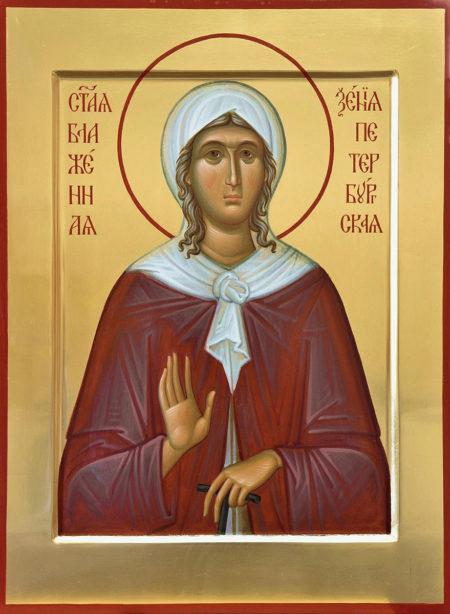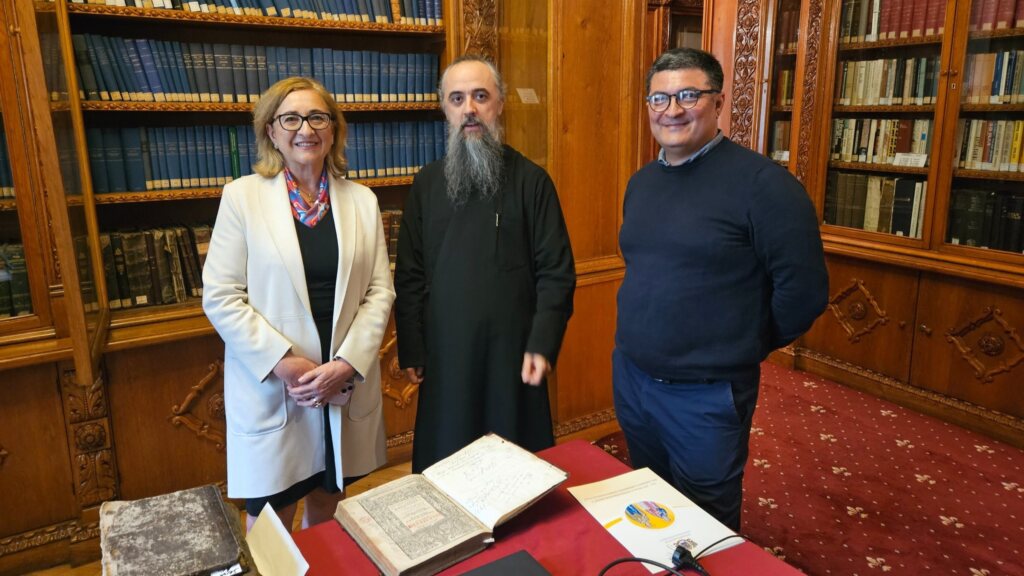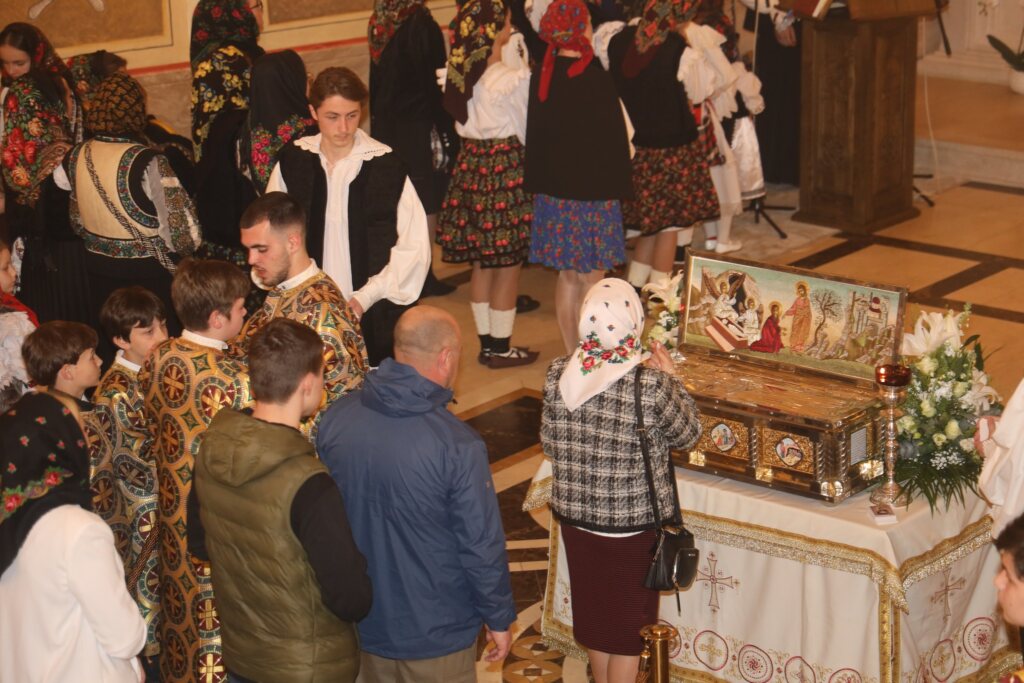Orthodox Calendar january 24
Saint Xenia of Rome
In the world Eusebia, was the only daughter of an eminent Roman senator. From her youth she loved God, and wished to avoid the marriage arranged for her. She secretly left her parental home with two servants devoted to her, and set sail upon a ship.
Through the Providence of God she met the head of the monastery of the holy Apostle Andrew in Milassa, a town of Caria (Asia Minor). She besought him to take her and her companions to Milassa. She also changed her name, calling herself Xenia [which means “stranger” or foreigner” in Greek].
At Milassa she bought land, built a church dedicated to Saint Stephen, and founded a woman’s monastery. Soon after this, Bishop Paul of Milassa made Xenia a deaconess, because of her virtuous life.
The saint helped everyone: for the destitute, she was a benefactress; for the grief-stricken, a comforter; for sinners, a guide to repentance. She possessed a deep humility, accounting herself the worst and most sinful of all.
In her ascetic deeds she was guided by the counsels of the Palestinian ascetic, Saint Euthymius. The sublime life of Saint Xenia drew many souls to Christ. The holy virgin died in 450 while she was praying.
During her funeral, a luminous wreath of stars surrounding a radiant cross appeared over the monastery in the heavens. This sign accompanied the body of the saint when it was carried into the city, and remained until the saint’s burial. Many of the sick received healing after touching the relics of the saint..
Troparion — Tone 3
Living the life of a stranger in the world, you estranged yourself from every sin; you abandoned comforts and fleeting honors and betrothed yourself to your Immortal Bridegroom. Glorious Xenia, entreat Christ our God to grant us His great mercy.
Saint Xenia of Petersburg
She lived during the eighteenth century, but little is known of her life or of her family. She passed most of her life in Petersburg during the reigns of the empresses Elizabeth and Catherine II.
Xenia Grigorievna Petrova was the wife of an army officer, Major Andrew Petrov. After the wedding, the couple lived in Saint Petersburg. Saint Xenia became a widow at the age of twenty-six when her husband suddenly died at a party. She grieved for the loss of her husband, and especially because he died without Confession or Holy Communion.
Once her earthly happiness ended, she did not look for it again. From that time forward, Xenia lost interest in the things of this world, and followed the difficult path of foolishness for the sake of Christ. The basis for this strange way of life is to be found in the first Epistle to the Corinthians (1 Cor. 1:18-24, 1 Cor. 2:14, 1 Cor. 3:18-19). The Lord strengthened her and helped her to bear sorrow and misfortune patiently for the next forty-five years.
She started wearing her husband’s clothing, and insisted that she be addressed as “Andrew Feodorovich.” She told people that it was she, and not her husband, who had died. In a certain sense, this was perfectly true. She abandoned her former way of life and experienced a spiritual rebirth. When she gave away her house and possessions to the poor, her relatives complained to the authorities. After speaking to Xenia, the officials were conviced that she was in her right mind and was entitled to dispose of her property as she saw fit. Soon she had nothing left for herself, so she wandered through the poor section of Petersburg with no place to lay her head. She refused all assistance from her relatives, happy to be free of worldly attachments.
When her late husband’s red and green uniform wore out, she clothed herself in rags of those colors. After a while, Xenia left Petersburg for eight years. It is believed that she visited holy Elders and ascetics throughout Russia seeking instruction in the spiritual life. She may have visited Saint Theodore of Sanaxar (February 19), who had been a military man himself. His life changed dramatically when a young officer died at a drinking party. Perhaps this officer was Saint Xenia’s husband. In any case, she knew Saint Theodore and profited from his instructions.
Saint Xenia eventually returned to the poor section of Petersburg, where she was mocked and insulted because of her strange behavior. When she did accept money from people it was only small amounts, which she used to help the poor. She spent her nights praying without sleep in a field outside the city. Prayer strengthened her, and in her heart’s conversation with the Lord she found the support she needed on her difficult path.
When a new church was being built in the Smolensk cemetery, Saint Xenia brought bricks to the site. She did this in secret, during the night, so that no one would know.
Soon her great virtue and spiritual gifts began to be noticed. She prophesied future events affecting the citizens of Petersburg, and even the royal family. Against her will, she became known as someone pleasing to God, and nearly everyone loved her.They said, “Xenia does not belong to this world, she belongs to God.” People regarded her visits to their homes or shops as a great blessing. Saint Xenia loved children, and mothers rejoiced when the childless widow would stand and pray over a baby’s crib, or kiss a child. They believed that the blessed one’s kiss would bring that child good fortune.
Saint Xenia lived about forty-five years after the death of her husband, and departed to the Lord at the age of seventy-one. The exact date and circumstances of her death are not known, but it probably took place at the end of the eighteenth century. She was buried in the Smolensk cemetery.
By the 1820s, people flocked to her grave to pray for her soul, and to ask her to intercede with God for them. So many visitors took earth from her grave that it had to be replaced every year. Later, a chapel was built over her grave.
Those who turn to Saint Xenia in prayer receive healing from illness, and deliverance from their afflictions. She is also known for helping people who seek jobs.
Troparion — Tone 5
Having lived as a stranger in the world, you outwitted the deviser of evil by your pretended foolishness, O Xenia. You received the grace from God to foresee and foretell things to come. Now, as you have been translated from earth to heaven, you are numbered with the choirs of the angels.







